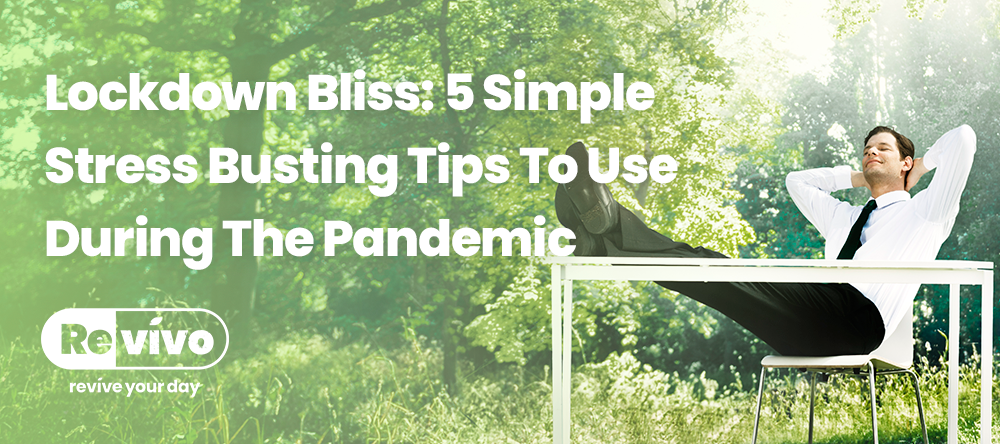Lockdown Bliss: 5 Simple Stress Busting Tips To Use During The Pandemic

With Coronavirus (COVID-19) dominating the news and many already in self-isolation, the impact of the pandemic is being felt by millions. We are all feeling the strain – physical and mental wellbeing has never been more important.
And in the absence of things we've come to rely upon, such as a designated work space and team spirit, you are totally excused of feeling anxious or confused about not knowing where to begin, many friends and family we've heard from are going through the exact same.
According to the Mental Health Foundation, 74 per cent of us have felt so stressed at some point over the past year that we’ve felt overwhelmed and unable to cope.[1] – and that was before COVID-19.
Taking steps to reduce stress – linked to anxiety, depression, insomnia, heart disease, poor immunity and digestive problems – is one of the most important things we can do for our health at this, or any time.
Here are our top 5 tips to help you cope with the anxiety and loneliness that may arise:
1. Stick to a routine
When staying home, it can be easy to let your usual routine slip. But research has shown that when people experience stress, they tend to skip their routine activities, which doesn’t facilitate healthy coping.
Waking up early, taking a lunch break and going to sleep at your usual time can all help you stay in control and keep your anxiety at bay. The best tip we have heard is from one of our partners, who gets on the exercise bike for 20 minutes before work and 20 minutes after – she calls it her 'daily commute'. We think it's a great idea as it bookends your workday and brings a little normality and structure to your day. The funny thing is she doesn't even cycle to work usually – it's usually a cramped train ride in to the city centre. What a genius idea! Let us know if you have any creative ideas as good as this one.
Keep on top of your nutrition and hydration. A balanced diet and getting three healthy meals a day will help to boost your immune system and stay healthy. Caffeine is known to raise anxiety levels so it might be good to avoid the black stuff. If you just have to have your fix why not try adding your daily dose of CBD to your coffee? Research shows that Cannabidiol (CBD), is known to reduce stress and anxiety.

2. Exercise outdoors
The mental health benefits of both exercise and being somewhere green are well proven, so guess what happens when you combine them? Research confirms all-round health, fitness, mood and self-esteem are improved while mental fatigue and stress are reduced.[2]
And if you can't exercise outdoors...?
Currently in the UK there is an allowance of exercise – we don't know how long this lockdown is going to last and exercise is proven to boost our mood levels. If you would rather not go out, then tune your radio to some up-tempo music and dance your heart out! A 2007 study found the effects to be comparable to an aerobic workout. The effects of a good ol' dance last longer than you may think.
Take a look at these NHS 10-minute workouts for inspiration and step-by-step routines.
According to a study conducted by University of Hertfordshire Psychology Professor Peter Lovatt, the happiness experienced while dancing is measurable even after dancing, increased levels in happiness present as long as a week after the last dance.
If you have a disability then be sure to check out this advice for getting active with a disability. If you can’t get outside, the sounds of nature can be of benefit. A quick search of YouTube, Spotify or any meditation app will find recordings of waves crashing or birds singing, so tune in to some aural therapy.
Research has shown that even just looking at images of the natural world (compared to urban environments) is calming.[3] Select a beautiful photo of the outdoors for your screensaver, and place a few botanical pictures around your desk at work.
3. Enjoy your garden
This could mean having your morning cup of tea in the garden. Or sitting out on your patio, listening to the birds singing or meditating on the branches blowing in the wind. If you need to make a (video) phone call to connect with work mates, do it outside (providing your wi-fi can reach).
Read a book, sketch, write your diary, take some photos. Look for opportunities to get back to nature, whatever the task at hand.
Our gardens are often neglected. Maybe there's a bit of maintenance that you can take care of – varnishing that wooden bench, painting your fence or shed will extend its life and make it look better, re-arrange and declutter the garage.
Catching up on these often neglected jobs will keep you occupied and give you a sense of satisfaction when you've finished. You may even find you enjoyed it and offer to help a neighbour with a DIY project – small acts of kindness towards other people can help improve your mental wellbeing and keep you in connection with other people.
If you are green-fingered, go outside to water and check in on your plants each day, taking the time to really notice how they have changed since the day before. No garden? Build a collection of houseplants and learn to care for them (just be careful not to over-water them!)
4. Experience Flow
Whether it’s cooking, drawing, listening to music or reading, prioritising hobbies that make you feel good is all-important. Throwing yourself into your passions lets you take some time out of the current situation, connect with your inner self and relax.
One of the best ways to look after your mental health is to access flow state at least once per day. Flow state is that amazing place where time just stops.
To access it, you want to be doing something that’s hard enough that you have to concentrate but not so challenging that you give up.
Everyone will have different activities they’re drawn to. What do you fancy trying to access your flow state? Here are 5 examples you can practice at home:

5. Connect with others
Although this can feel like quite a lonely time, it’s important to remember that we are all in this together. Reach out to your family, friends or even work colleagues for regular voice or video calls.
According to the NHS, good relationships are important for your mental wellbeing.
They can:
- help you to build a sense of belonging and self-worth
- give you an opportunity to share positive experiences
- provide emotional support and allow you to support others
Make time for connection and reaching out to the people you’re closest to, even if that’s via phone or video chat.
During this period of unknown, we appreciate it’s essential you have access to the supplements you need. We are working closely with our stockists to ensure they have a continued supply of products and our home delivery service is running as usual.
If you’re feeling worried or anxious about the Coronavirus and would like further information and support, click here to head over to the Mind Charity.












